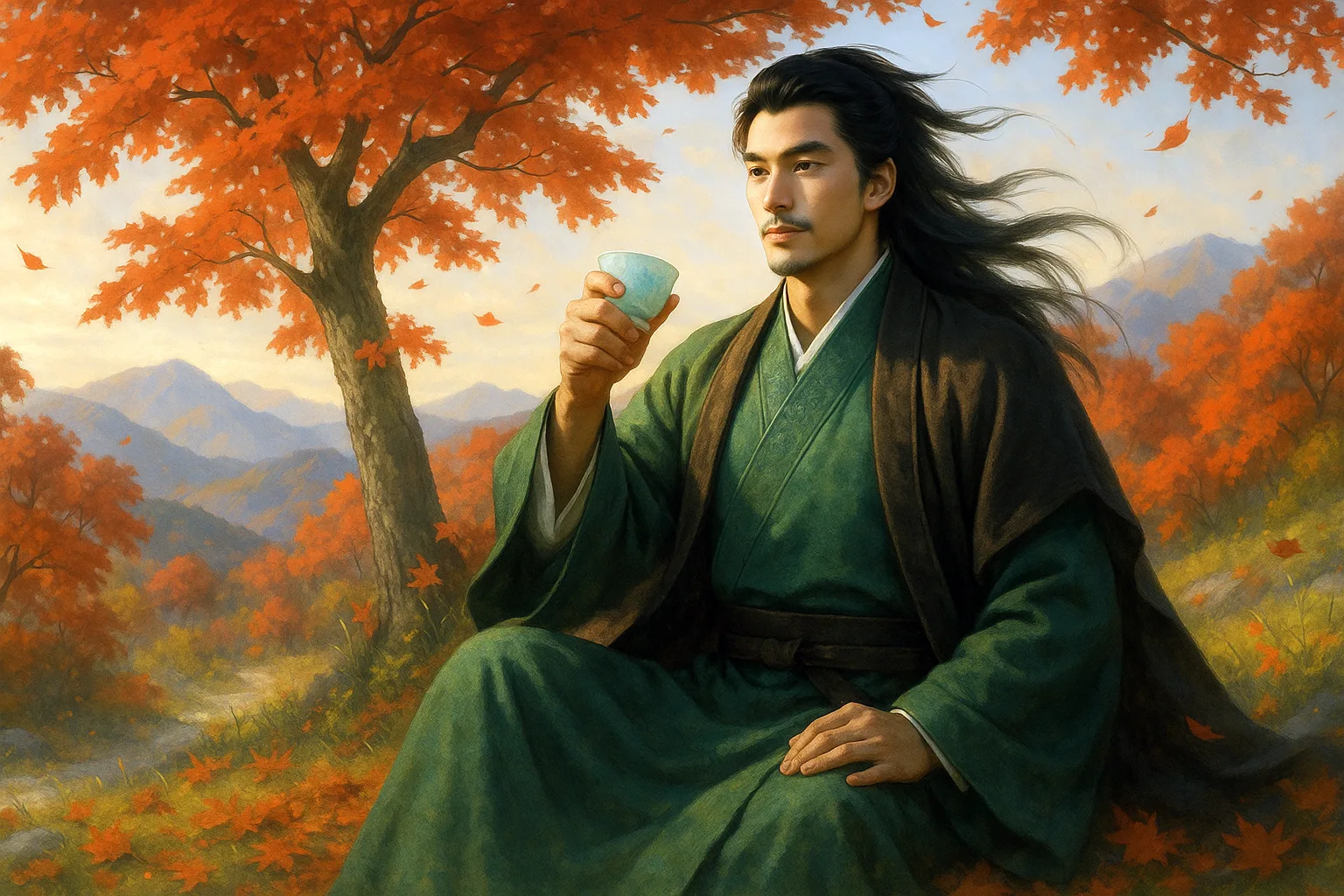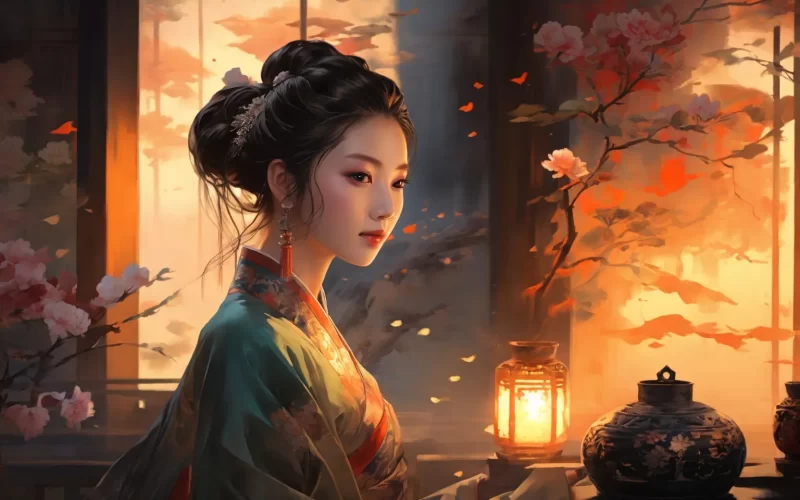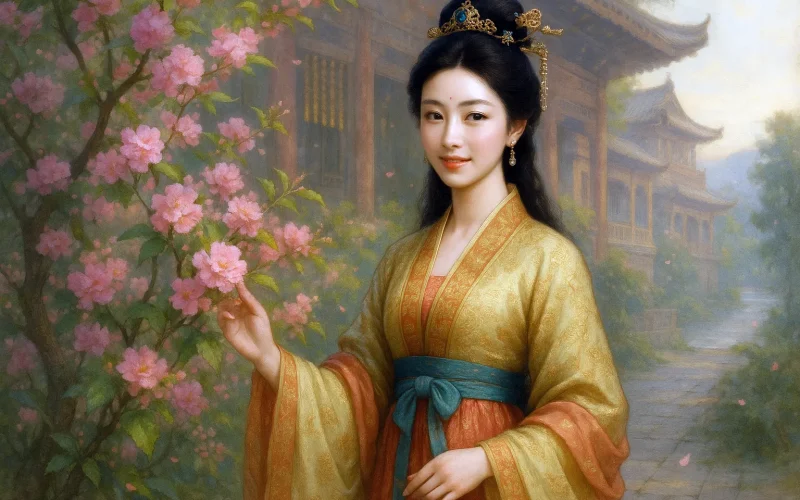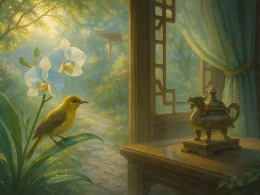How can a deep love seem deep love,
How can it smile, at a farewell feast?
Even the candle, feeling our sadness,
Weeps, as we do, all night long.
Original Poem
「赠别二首 · 其二」
杜牧
多情却似总无情,惟觉樽前笑不成。
蜡烛有心还惜别,替人垂泪到天明。
Interpretation
This poem was composed during the same period as the first, in the spring of 835 AD on the eve of Du Mu's departure from Yangzhou for the capital. Although they form a pair, the two poems differ completely in their emotional focus and artistic technique. If the first poem is characterized by outward projection, with the poet directing his full gaze and praise onto the beloved, crafting an eternal poetic portrait of her, then this second poem is one of introspective reflection. The poet withdraws his gaze, turning it inward for profound self-examination and dissection of his true emotional state at the moment of parting.
At this juncture, Du Mu stood at a turning point in his life. Leaving the prosperity, vibrancy, and relative freedom of Yangzhou for the political center of Chang'an, his future was filled with uncertainty. This parting with a kindred spirit was thus imbued with more complex personal reflections on his own circumstances. The poem's emotional tension springs not only from romantic attachment but also, subtly, from a lingering attachment to the passing of a carefree time and anxiety about an unpredictable future. Therefore, this short poem, which uses "appearing heartless" to convey "being most sentimental" and employs a "candle" to represent "human tears," is in fact the poet's way of writing, through a highly condensed and symbolic technique, about the indescribable heaviness and agitation he experienced at this critical life juncture.
First Couplet: 多情却似总无情,唯觉樽前笑不成。
Duō qíng què sì zǒng wú qíng, wéi jué zūn qián xiào bù chéng.
So full of love, yet seeming ever heartless I appear; Before the farewell cup, I find a smile will not come near.
The opening lines plunge directly into the most complex, contradictory depths of emotion, posing a poignant paradox. "Full of love" is the essence and foundation, the source of parting sorrow; "seeming ever heartless" is the external manifestation at the moment of farewell—a stiffness or silence in speech and action, even an appearance of detachment, caused by emotions too intense and heavy to express. This psychological truth, where overwhelming emotion manifests as its apparent opposite, is keenly captured and precisely articulated by the poet. The next line deepens this contradiction with a concrete scene: "Before the farewell cup" is a place for socializing, consolation, and expressing feelings, where one should ideally be talkative and cheerful to dilute the sadness. Yet the three words "a smile will not come" freeze, like a close-up, the instant all attempts at pretense ultimately fail, revealing how utterly real and overpowering the grief is. This inability to feign cheerfulness conveys the bone-deep pain of parting more powerfully than floods of tears.
Final Couplet: 蜡烛有心还惜别,替人垂泪到天明。
Làzhú yǒu xīn hái xī bié, tì rén chuí lèi dào tiān míng.
The candle has a wick that grieves too at our sad goodbye; And sheds替人 tears for us until the morning sky.
This couplet is a stroke of genius, elevating the lyrical expression to a realm where subject and object merge. The poet projects his feelings onto an object, endowing an inanimate thing with human emotion and perception. "The candle has a wick" cleverly puns on the word "wick" (芯, xīn), which sounds identical to "heart/mind" (心, xīn). The wax dripping down a burning candle resembles flowing tears—a physical phenomenon the poet interprets as "shedding tears for us." This is the externalization of inner, formless, boundless, unbearable grief into a visible, tangible, and continuous concrete flow. The phrase "for us" is especially profound and subtle: perhaps the people themselves are too sorrowful to shed tears, or perhaps human tears are insufficient to express this depth of sorrow, so they must borrow an object to give full vent to their grief. "Until the morning sky" hints at the all-night duration of the farewell banquet and the long, night-like ordeal both parties endure in silence. The candle's tears ceasing only at dawn symbolize the lingering, profound nature of parting sorrow, which cannot be resolved in a short while.
Holistic Appreciation
This heptasyllabic quatrain is an exemplar of expressing parting emotion in classical poetry. Its artistic charm lies in successfully refining and elevating an extremely personal, momentary emotional experience into a classic scenario with universal resonance.
The poem's core lies in the artistic handling of emotional "suppression" and "projection." The first two lines describe "suppression": extreme emotional fullness ("full of love") leads to extreme external restraint and an uncharacteristic demeanor ("seeming heartless," "smile will not come"). This is an implosive state under immense emotional tension. The last two lines describe "projection": when human emotion cannot be fully borne and expressed on a personal level, it is "projected" onto an object in the surroundings (the candle), letting the object complete the emotional ritual of "grieving at our goodbye" and "shedding tears" on behalf of the people. This lyrical shift from "person" to "object" not only avoids emotional directness and exhaustion but also creates a heartbreakingly beautiful, richly meaningful symbolic world.
Unlike the first poem's bright, open, and celebratory tone, this poem is consistently enveloped in an atmosphere of subdued light, introspection, and painful anticipation. It does not showcase beauty but pain; it does not depict the other but dissects the self; its backdrop is not a city's spring scenery but the stage of a single room's candlelight. The two poems, one outward and one inward, one rising and one restrained, together constitute a complete and three-dimensional emotional universe of a farewell moment.
Artistic Merits
- Profound Tension of a Paradoxical Opening: "So full of love, yet seeming ever heartless I appear." This opening immediately establishes the poem's complex, profound emotional tone. It reveals an emotional truth beyond everyday logic—the deepest feelings often cannot be presented in the most direct manner but disguise themselves in contrary appearances. This use of paradox carries tremendous intellectual and emotional force.
- Detail Capture and Scene Freeze-frame: "Before the farewell cup, I find a smile will not come." The poet selects the most pregnant instant of the farewell banquet—"a smile will not come." This detail contains multiple psychological layers: the attempt to rally one's spirits, the failure of the effort, the precarious state before the emotional dam breaks. It encapsulates the emotional essence of the entire parting scene in a single moment, possessing great typicality and power to move.
- Perfect Fusion of Personification and Symbolism: The use of the candle imagery reaches the highest realm of personification and symbolism. Personification lies in endowing it with a "heart" (via the pun) and the feeling of "grieving at our goodbye." Symbolism lies in the candle itself being a multilayered metaphor for burning, giving, illuminating the night of parting, and consuming itself in its own "tears." It is simultaneously a stage prop, an emotional vehicle, and an objective correlative for the poet's and his beloved's feelings, its implications exceedingly rich.
- Skillful Control of Emotional Rhythm: The poem's emotional flow is like an underground river. The first line is a deep vortex (full of love/heartless), the second is a suppressed blockage (smile will not come), the third is a transfer and outlet for the emotion (candle having a heart), and the final line is the complete, lingering release of emotion (shedding tears until dawn). This rhythm of moving from internal restraint to external expression, from stagnation to flow perfectly matches the psychological process of emotion developing, accumulating, and finally finding an outlet during a farewell night.
Insights
The insights offered by this profound quatrain seep in slowly and deeply, like the candle tears in the poem. It first concerns the recognition and understanding of emotion. The poem reveals an often-overlooked truth: the most intense emotions do not necessarily manifest externally in passionate words or tears; they may instead appear as the silence of "seeming heartless" and the heaviness of "a smile will not come." In human interaction, we are often accustomed to listening to speech but struggle to read silence; we are good at responding to smiles but find it difficult to bear the weight of that "inability to smile." This poem reminds us that true depth of feeling sometimes resides beneath such speechless surfaces, requiring more acute perception and greater patience to decipher the emotional code that transcends words.
Furthermore, it points to the wisdom of artistic expression. Du Mu does not directly confess "how sad I am." Instead, he turns his gaze to the candle on the table, letting its "heartfelt" wick "shed tears for us." This move accomplishes a leap from "direct emotional outpouring" to "projecting emotion onto an object." It demonstrates how to find a concrete, beautiful, and meaning-rich objective correlative for abstract, chaotic inner feelings. Here, the candle is not merely a prop but a container and symbol for emotion. This enlightens us that in writing or other forms of creation, letting an external "object" become a mirror and spokesperson for inner "feeling" can often avoid expressive exhaustion and overly direct statement, thereby achieving more universal and lasting resonance.
Finally, it interrogates the experience and inherent dilemmas of life itself. Parting, as a constant of life, is always accompanied by a sorrow difficult to fully contain or settle. The poem presents the complete emotional journey of confronting this sorrow: beginning with honest acknowledgment of the emotion itself ("full of love"), passing through its atypical expression at a special moment (the suppression and struggle of "seeming heartless" and "smile will not come"), and ultimately finding a poetic, symbolic outlet ("the candle sheds tears for us"). This is not merely a rhetorical device; it can be seen as a path to emotional healing and sublimation. It suggests that when emotions themselves are too vast to be directly processed on a practical level, externalizing and objectifying them through artistic, symbolic means may help us coexist with them. In the process of contemplation and expression, we may attain a measure of release and transcendence. With this single poem, Du Mu provided an immortal dwelling place for all the sorrow of parting that finds no easy resting place.
Poem translator
Kiang Kanghu
About the poet

Du Mu (杜牧), 803 - 853 AD, was a native of Xi'an, Shaanxi Province. Among the poets of the Late Tang Dynasty, he was one of those who had his own characteristics, and later people called Li Shangyin and Du Mu as "Little Li and Du". His poems are bright and colorful.












